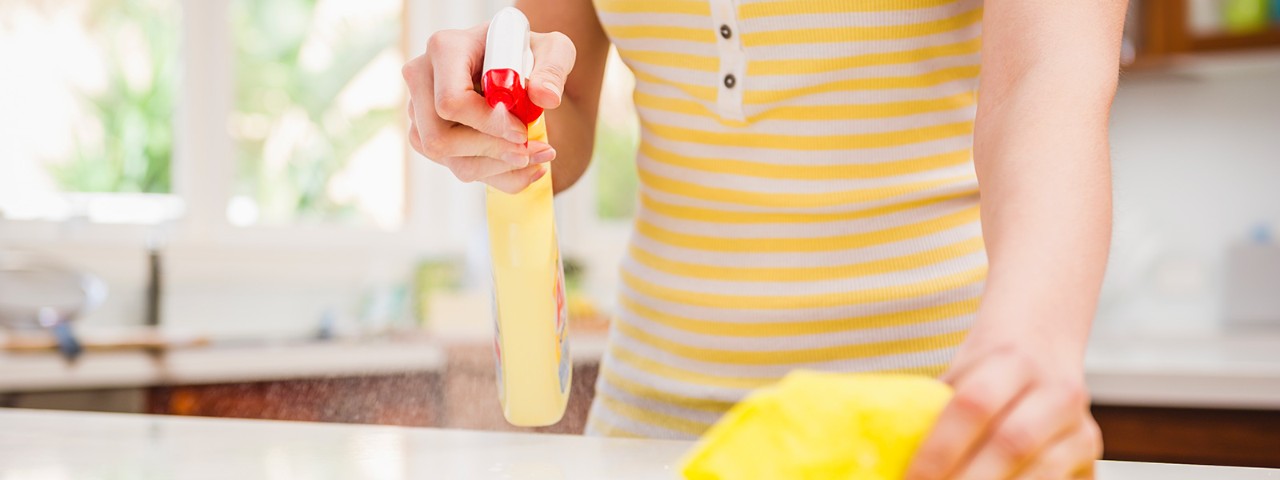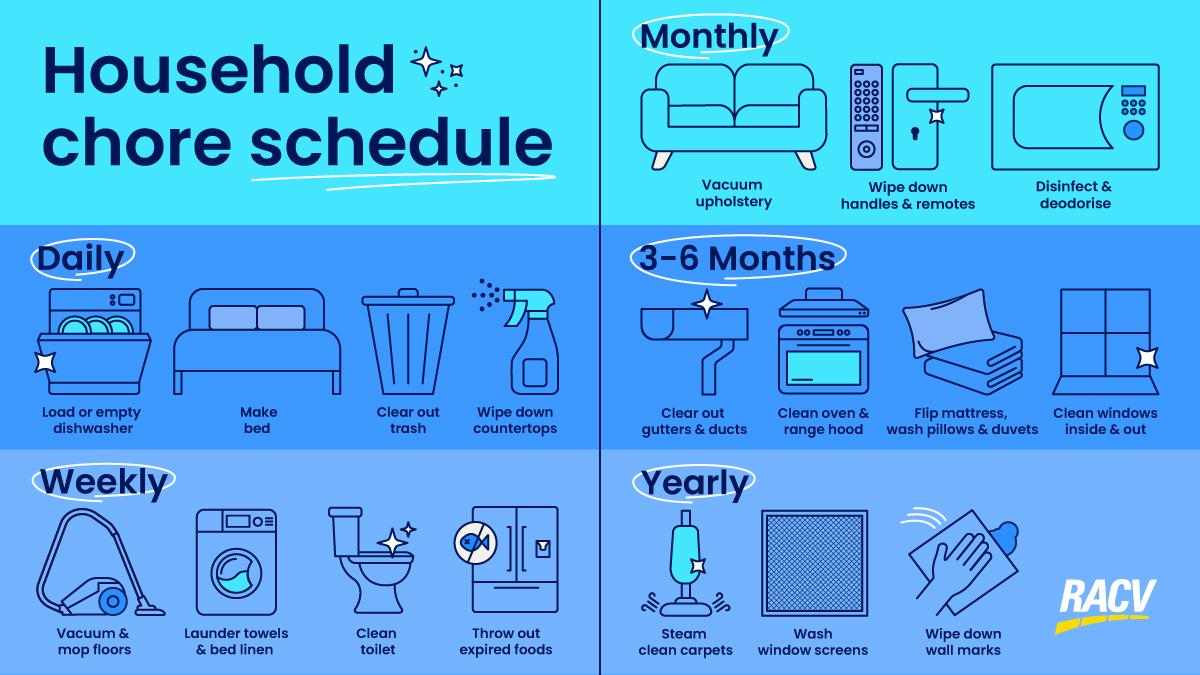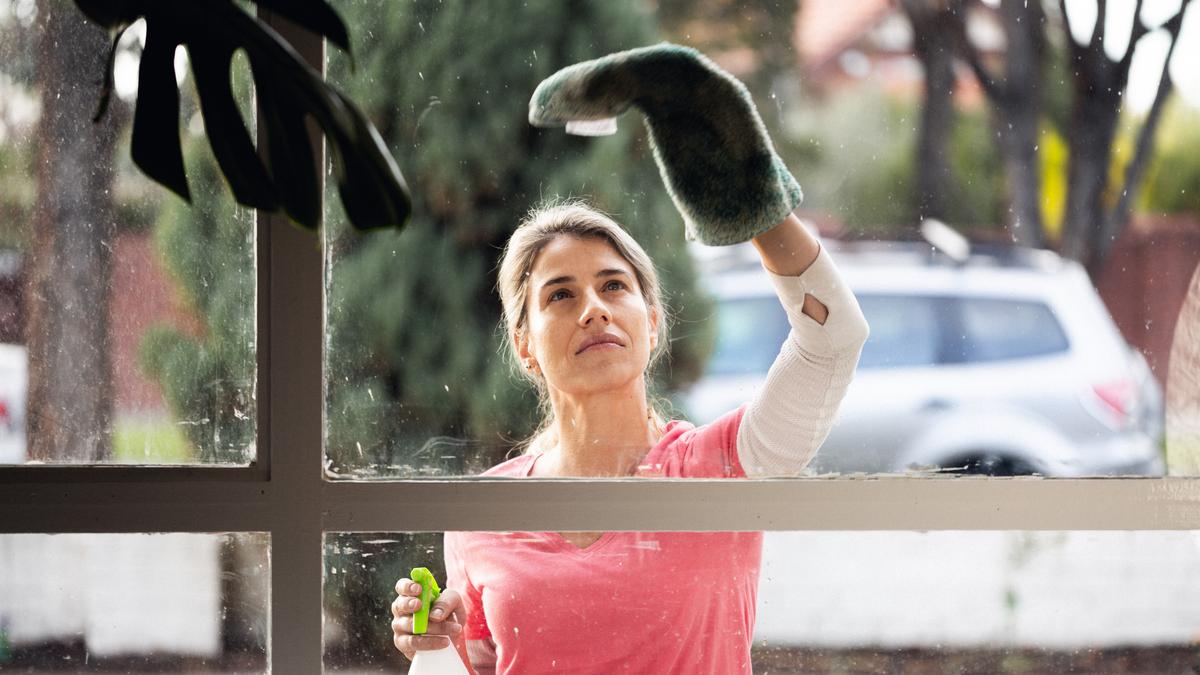Completing home maintenance can help should you need to make an insurance claim. Here are the maintenance tasks you shouldn't neglect.
House cleaning hacks and tips for a cleaner home

These home cleaning hacks and tidying tips will help you get your house looking spick and span in no time, and help you avoid wear and tear.
If the idea of cleaning the house fills you with dread, fear not - there are lots of ways to tackle the mess and enjoy the satisfaction of a job well done. Whether you play music to motivate you or you call a friend (hands-free) to distract you, household chores are easier when you have a positive approach.
While it's a great idea to undertake an annual spring clean to avoid household wear and tear, you can also stay on top of your regular household chores with these easy-to-follow cleaning hacks and tips.
Home cleaning secrets and tips
1. Create a chore schedule
From organising your kitchen pantry and cleaning your bathroom to fireplace maintenance and safety checks, regularly attending to chores actually relieves stress and keeps your home in good condition.
There are some commonly missed home maintenance issues worth knowing about, and always clean up any water spills and fix leaks to prevent water damage in the home.
A good chore schedule will prevent a mountain of work piling up. Create a personalised cleaning schedule that works for you (and your household members). Another tip is to clean for a shorter amount of time, but more often. For example, clean everyday for 30 minutes and by the end of the week you'll have the same result as cleaning for half a day on the weekend.
2. Follow the one-touch rule
Everything in your home has a proper place, and that place probably isn’t your floor or your kitchen counter. Avoid wasting time decluttering by following the one-touch rule: When you pick something up or carrying something into the house, don’t do anything else until you put it away.
That means dropping junk mail directly into your recycling bin, hanging up your jacket instead of draping it over a chair, and putting a dish straight into the dishwasher instead of leaving it in the sink. Cultivating this habit will take a big task off your plate on cleaning day, and it leaves your entire home looking neater 24/7.
More: Most common home emergency callouts to tradies

Creating a chore schedule can help you stay on top of tasks.
3. Keep your cleaning equipment clean
When was the last time you cleaned your kitchen sponge or duster? Wiping away spills and stains with dirty equipment can spread germs around your house, so take a moment to clean your gear before hitting those big cleaning tasks.
Dish sponge – if your dish sponge doesn’t contain any metal, soak it in water and pop it in the microwave for 1-2 minutes to kill any bacteria on it. Alternatively wash it in hot soapy water, wring it out, then soak it in boiling water before letting it dry.
Duster – invest in a pack of microfibre cloths or a duster with a removable microfibre head. Microfibre is a fabric that attracts and holds dust with an electrostatic charge. It also doesn’t leave behind lint, dust or fibres. Best of all, it’s machine-washable. Colour code your cloths by room (for example: kitchen, bathroom, bedroom) for an easy way to avoid cross-contamination.
Mop – to quickly disinfect a mop head, immerse it in boiled water until the water cools, then let dry. Replace your mop head every three months: most brands sell replacement heads.
Vacuum cleaner – apart from emptying the receptable, check whether you can wash the filters. If you can’t, tap as much dirt and dust off as you can. Check the nozzle for any debris blockages, and cut hairs and threads from the brush head with a pair of scissors (taking care not to snip away the bristles).
Washing machine – once a month, run a hot wash with no clothes or detergent to eliminate mould and bacteria. There are also many ways you can save money on your laundry costs.
Clothes dryer – clear out any debris, then rub the drum with a microfibre cloth dipped in mild dish soap diluted in hot (but not boiling) water. Tumble a load of clean clothes or towels to dry. To clean out your dryer’s exhaust vent, you will need to hire a professional or buy a dryer vent cleaning kit. Find out which type of clothes dryer is more energy efficient and economical.
4. Buy some vinegar and bicarb soda
Even if you prefer to use store-bought cleaning products, having natural cleaning products like vinegar and bicarbonate of soda (also called bicarb or baking soda) on hand can really pay off.
Vinegar and bicarbonate can be used in a wide variety of cleaning tasks across all rooms in your house and are effective when it comes to stain removal (and can save you money at the same time).
Here are just a few ways that you can use these common household products:
Easily unclog drains - pour half a cup of bicarb soda down the drain, followed by a cup of vinegar. Cover the drain wait for 15 minutes, then chase it up with boiling water to clear out your drain. If you have a serious or emergency clog that you can’t solve, book a qualified plumber.
Wipe your windows clean - make a solution of 1:1 vinegar and water and pour into a spray bottle. Spray onto your glass windows, let sit for a moment, then wipe clean with a microfibre cloth.
Keep your microwave squeaky clean - put equal amounts vinegar and water in a microwave-safe bowl, plus a small wooden object (like a toothpick) to prevent boiling. Set your microwave on high for 5-10 minutes, then wait a few minutes to let it cool down. Then simply wipe down the inside with a paper towel or a sponge.
Banish built-up grime and odours in your dishwasher- put a cup of vinegar on the upper rack and run a hot cycle. Then sprinkle a cup of bicarb soda across the bottom of the dishwasher and run a short hot cycle.
Get your glassware sparkling - soak away built-up film on your glasses with vinegar for 5 minutes. Hand rinse them afterwards and dry with a microfibre cloth for a streak-free shine.
Quickly scrub away soap scum in your shower – create a solution of half vinegar and half dish soap. Pro tip: put the solution into a dish wand for extra easy cleaning!
Tackle shower grout - mix bicarb and water into a paste and working it into tile grout with an old toothbrush. Fill a spray bottle with vinegar and spray it over the paste so that it bubbles into a thick mixture. Then get scrubbing, and rinse well with water when you’re done.
Clean off grimy shower glass - first give it a wipe down with a microfibre cloth to remove hairs and lint. Fill a spray bottle with 1:9 white vinegar to water and spray the glass down. Buff the glass with a clean microfibre cloth.
Restore your shower head’s water pressure - pour half white vinegar and half water into a small plastic bag. Tie the bag around your shower head so that the holes are immersed, securing the bag with a twist tie or similar. Let it soak for about 60 minutes, then remove the bag and wipe away the loosened limescale deposits.
Break up fabric stains and odours - sprinkle some bicarb soda over the offending area. Let it sit for 15-20 minutes, then vacuum it up with a brush attachment.
Prevent musty smells in your linen closet - store your open box of bicarb soda near your sheets and towels.
Absorb food odours in your fridge - keep a ramekin full of bicarb soda on a shelf.
More: How to avoid and remove mould in your home

Vinegar and bicarb soda can be used for many household cleaning jobs, such as cleaning your windows.
5. Detox your bins and garbage disposal
Lemon is your best friend when it comes to getting rid of nasty odours. If you have a garbage disposal, cut a lemon up and throw a few small slices down the disposal, followed by cold water. The blades will cut through the lemon, releasing a fresh citrus smell while the citric acid kills bacteria and softens hard waste.
Deep clean your empty kitchen bin once a week by filling it with hot, soapy water and leaving it for an hour. After rinsing, use fresh soapy water and a scouring pad to scrub the interior.
To neutralise any remaining odours, sprinkle bicarb soda into the bin and leave for an hour or two. You can also put natural deodorisers like bicarb soda, vinegar, lemon or coffee grounds in bins and rubbish bags to help soak up odours.
Recycling effectively can help divert millions of tonnes of waste from ending up in landfill. Find out the most common recycling mistakes and how to avoid them.


